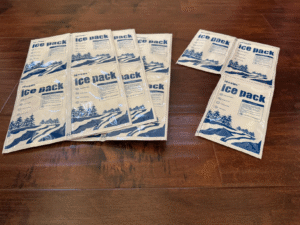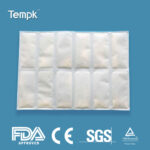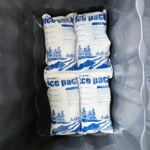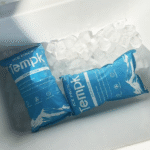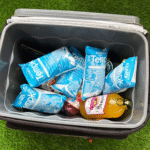When transporting perishable goods, maintaining temperature control is crucial. One of the most popular methods involves using dry ice packs. But are these packs food-grade, BPA-free, and FDA certified? This article delves into these safety standards, helping you understand how these factors impact the transportation of sensitive products.
-
What Does “Food-Grade” Mean for Dry Ice Packs?
-
Why Are BPA-Free Dry Ice Packs Important?
-
How Do FDA Certifications Ensure Dry Ice Pack Safety?
-
What Are the Latest Trends in Dry Ice Pack Safety?
What Does “Food-Grade” Mean for Dry Ice Packs?
Food-grade dry ice packs are designed with materials that meet strict safety standards, ensuring they are safe for direct contact with food. These materials are free from harmful chemicals and contaminants, which could otherwise compromise the quality and safety of food during transportation.
Key Factors:
-
Purity: Food-grade dry ice packs are made with high-purity materials, minimizing the risk of contamination.
-
Safety Standards: These packs meet rigorous regulations, including FDA guidelines, ensuring they don’t leach harmful substances into food.
Food-grade dry ice is tested to meet high standards. Non-food-grade alternatives might contain harmful chemicals that pose a risk to health.
Why Is Food-Grade Material Essential for Dry Ice Packs?
Food-grade dry ice packs are critical for industries like food delivery, pharmaceuticals, and cold chain logistics. They ensure the preservation of products like frozen meals, vaccines, and more, without contamination.
Practical Application:
-
Cold Chain Logistics: Whether you’re shipping food or medical products, choosing food-grade dry ice packs guarantees the integrity of your products.
Are Dry Ice Packs BPA-Free, and Why Does It Matter?
BPA (Bisphenol A) is a chemical commonly used in plastic manufacturing. Exposure to BPA can lead to health issues like hormonal imbalances and increased risks of certain cancers. While dry ice itself doesn’t contain BPA, many ice packs are encased in plastic that may contain this harmful chemical.
Why BPA-Free Is Crucial for Dry Ice Packs:
-
Health Protection: BPA-free packs prevent chemicals from leaching into the contents being transported.
-
Eco-Friendly Options: Many manufacturers now prioritize using BPA-free materials to align with consumer demand for health-conscious products.
BPA-Free Dry Ice Packs vs. Standard Dry Ice Packs:
| Type | Material | Health Safety | Environmental Impact |
|---|---|---|---|
| BPA-Free Packs | BPA-free plastics | Safer for food | Environmentally friendly |
| Standard Packs | Potential BPA plastics | Possible chemical leaching | Higher risk of contamination |
How Do FDA Certifications Impact the Safety of Dry Ice Packs?
FDA certifications are vital for dry ice packs, especially those used in food and pharmaceutical transportation. These certifications ensure that the materials in the dry ice packs meet safety standards for indirect food contact.
Why FDA Certification Matters:
-
Regulatory Compliance: FDA-compliant dry ice packs are regularly tested to ensure they meet safety standards and do not release harmful substances into the environment.
-
Guaranteed Safety: By choosing FDA-certified packs, you are ensuring that your products are transported safely and within regulatory requirements.
FDA-Certified Dry Ice Packs:
| Type | Certification | Safety Assurance |
|---|---|---|
| FDA Certified | Meets FDA guidelines | Safe for food and medical products |
| Non-Certified | May not meet required standards | Higher risk of contamination |
Real-World Example:
In the pharmaceutical industry, where product integrity is critical, using FDA-certified dry ice packs ensures that vaccines remain safe during transport, meeting strict temperature control regulations.
2025 Trends in Dry Ice Pack Safety and Regulations
The dry ice pack industry is continuously evolving, driven by consumer demand for safer, eco-friendly products. Here are the latest trends:
-
Sustainable Materials: Manufacturers are now exploring biodegradable packaging options to reduce environmental impact.
-
Advanced FDA Guidelines: New regulations are pushing for more stringent safety standards in cold chain logistics, ensuring better product safety.
-
Enhanced Performance: Many dry ice packs are now designed to retain cold temperatures longer, making them more efficient and reducing waste.
Commonly Asked Questions
Q1: Are all dry ice packs food-safe?
Not all dry ice packs are food-safe. Look for packs specifically labeled as food-grade or FDA-certified to ensure they meet necessary safety standards.
Q2: How can I confirm if my dry ice pack is BPA-free?
Check the product label or contact the manufacturer. BPA-free dry ice packs are typically made from materials like polypropylene or polyethylene.
Summary and Recommendations
Choosing the right dry ice pack is essential for safe and efficient transportation. Ensure the packs are:
-
Food-Grade: Made from high-purity, non-contaminating materials.
-
BPA-Free: Free from harmful chemicals that could leach into your products.
-
FDA Certified: Ensuring compliance with safety standards for food and medical products.
Actionable Steps:
-
Always check for FDA certifications and BPA-free labeling before purchasing.
-
Select food-grade dry ice packs for transportation, especially for perishables and pharmaceuticals.
-
Stay informed on emerging trends in dry ice pack technology, such as sustainable and reusable options.
About Tempk
Tempk provides high-quality dry ice solutions for the food and pharmaceutical industries, ensuring compliance with FDA regulations and offering BPA-free products. Our dry ice packs provide superior performance, maintaining temperature control and ensuring the safety of your products throughout transportation.
Next Step: Contact us for personalized recommendations and expert advice on selecting the best dry ice solution for your needs.






